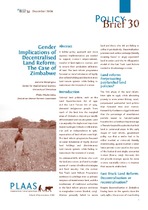| dc.contributor.author | Manjengwa, Jeanette | |
| dc.contributor.author | Mazhawidza, Phides | |
| dc.date.accessioned | 2010-01-06T09:42:58Z | |
| dc.date.available | 2010-01-06T09:42:58Z | |
| dc.date.issued | 2009-12 | |
| dc.identifier.citation | Manjengwa, J. and Mazhawidza, P. (2009) Gender implications of decentralised land reform: The case of Zimbabwe. Policy Brief no. 30, December 2009. PLAAS, University of the Western Cape | en_US |
| dc.identifier.uri | http://hdl.handle.net/10566/87 | |
| dc.description.abstract | A bolder policy approach and more
vigorous implementation are needed
to support women’s empowerment,
transfer of land rights to women, and
to ensure their productive utilisation
of land. The land reform programme
focussed on racial imbalances of highly
skewed land holdings and discriminatory
land tenure systems while failing to
mainstream the interests of women. | en_US |
| dc.language.iso | en | en_US |
| dc.publisher | PLAAS, University of the Western Cape | en_US |
| dc.relation.ispartofseries | Policy Brief;32 | |
| dc.rights | This file may be freely used provided that the source is acknowledged. No commercial distribution of this text is permitted. | |
| dc.subject | Land reform | en_US |
| dc.subject | Gender | en_US |
| dc.subject | Women | en_US |
| dc.subject | Land tenure | en_US |
| dc.subject | Women's rights | en_US |
| dc.subject | Zimbabwe | en_US |
| dc.subject.lcsh | Women in agriculture -- Zimbabwe | |
| dc.subject.lcsh | Rural women -- Zimbabwe | |
| dc.subject.lcsh | Land reform -- Zimbabwe | |
| dc.title | Gender implications of decentralised land reform: The case of Zimbabwe | en_US |
| dc.type | Other | en_US |
| dc.inquiries | plaas@uwc.ac.za | |
| dc.privacy.showsubmitter | true | |
| dc.status.ispeerreviewed | false | |

